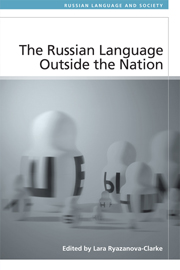Book contents
- Frontmatter
- Contents
- Notes on Contributors
- Cyrillic Transliteration System Adopted in the Book
- Introduction: The Russian Language, Challenged by Globalisation
- PART I Russian and Its Legal Status
- PART II Linguistic Perceptions and Symbolic Values
- PART III Russian-Speaking Communities and Identity Negotiations
- 5 Post-Soviet Russian-Speaking Diaspora in Italy: Results of a Sociolinguistic Survey
- 6 Ethnolinguistic Vitality and Acculturation Orientations of Russian Speakers in Estonia
- 7 Linguistic Performance of Russianness among Russian-Israeli Parents: Child-Raising Practices in the Immigrant Community
- PART IV Language Contact and the Globalisation of Russian
- PART V Globalisation of Russian as Soft Power
- Index
7 - Linguistic Performance of Russianness among Russian-Israeli Parents: Child-Raising Practices in the Immigrant Community
from PART III - Russian-Speaking Communities and Identity Negotiations
Published online by Cambridge University Press: 05 September 2014
- Frontmatter
- Contents
- Notes on Contributors
- Cyrillic Transliteration System Adopted in the Book
- Introduction: The Russian Language, Challenged by Globalisation
- PART I Russian and Its Legal Status
- PART II Linguistic Perceptions and Symbolic Values
- PART III Russian-Speaking Communities and Identity Negotiations
- 5 Post-Soviet Russian-Speaking Diaspora in Italy: Results of a Sociolinguistic Survey
- 6 Ethnolinguistic Vitality and Acculturation Orientations of Russian Speakers in Estonia
- 7 Linguistic Performance of Russianness among Russian-Israeli Parents: Child-Raising Practices in the Immigrant Community
- PART IV Language Contact and the Globalisation of Russian
- PART V Globalisation of Russian as Soft Power
- Index
Summary
‘SHOW RESPECT FOR A CHILD!’: STATING THE PROBLEM
The concept of Russianness – an expression of certain attitudes and values regarding childrearing on the part of Russian-Israeli parents raising their children – arose after observing a situation in a friend's house. My friends are Russian-speaking Jews who have lived in Israel for the last twenty years, as have I. A group of adults in my age group – Russian and native Israelis – got together around a table in my friend's home and there was some lively discussion. Our host's nine-year old son kept trying to interrupt in order to say something, but the adult company, including his mother, paid no attention to his numerous attempts. Eventually, the boy couldn't bear being ignored any longer and shouted loudly, addressing his mother: Ima, tni li kawod – ani yeled! (Mum, show me respect – I am a child! (Hebrew)).
The boy, a competent bilingual Russian and Hebrew speaker, used Hebrew to address his mother, when demanding respect, substantiating his demand, and focusing on his status – that of an Israeli child. His choice of Hebrew gave him, intuitively, a sense of confidence to adjust the language to fit his sense of who he is. The guests smiled encouragingly, the boy was allowed to speak, and the general conversation continued. It was apparent that modern Israeli society accepts such verbal behaviour in children. Children in Israel are clearly the focus of attention, they are allowed much leeway, and their active presence doesn't disturb the adults (Katriel 1991).
- Type
- Chapter
- Information
- The Russian Language Outside the Nation , pp. 189 - 206Publisher: Edinburgh University PressPrint publication year: 2014



